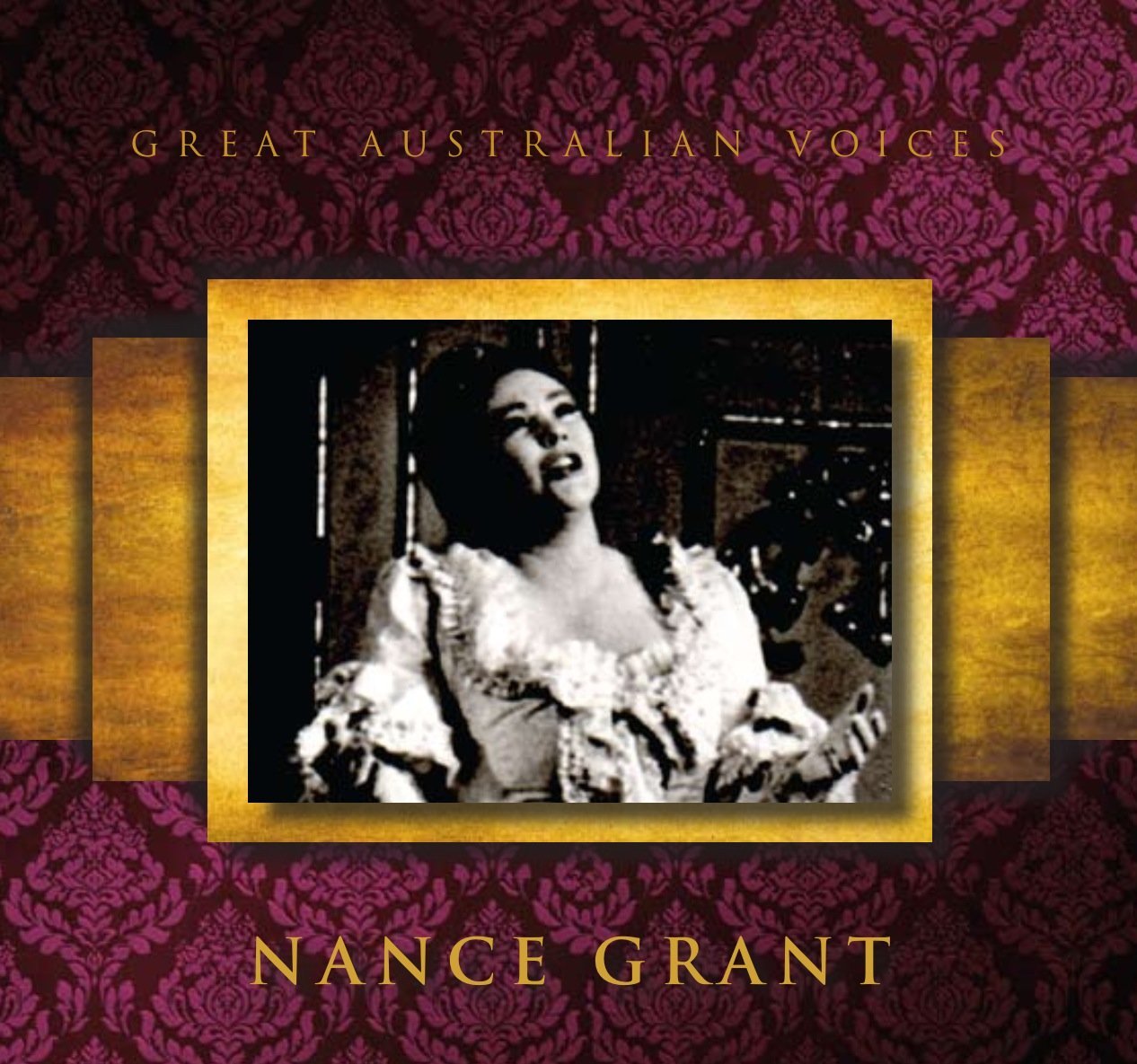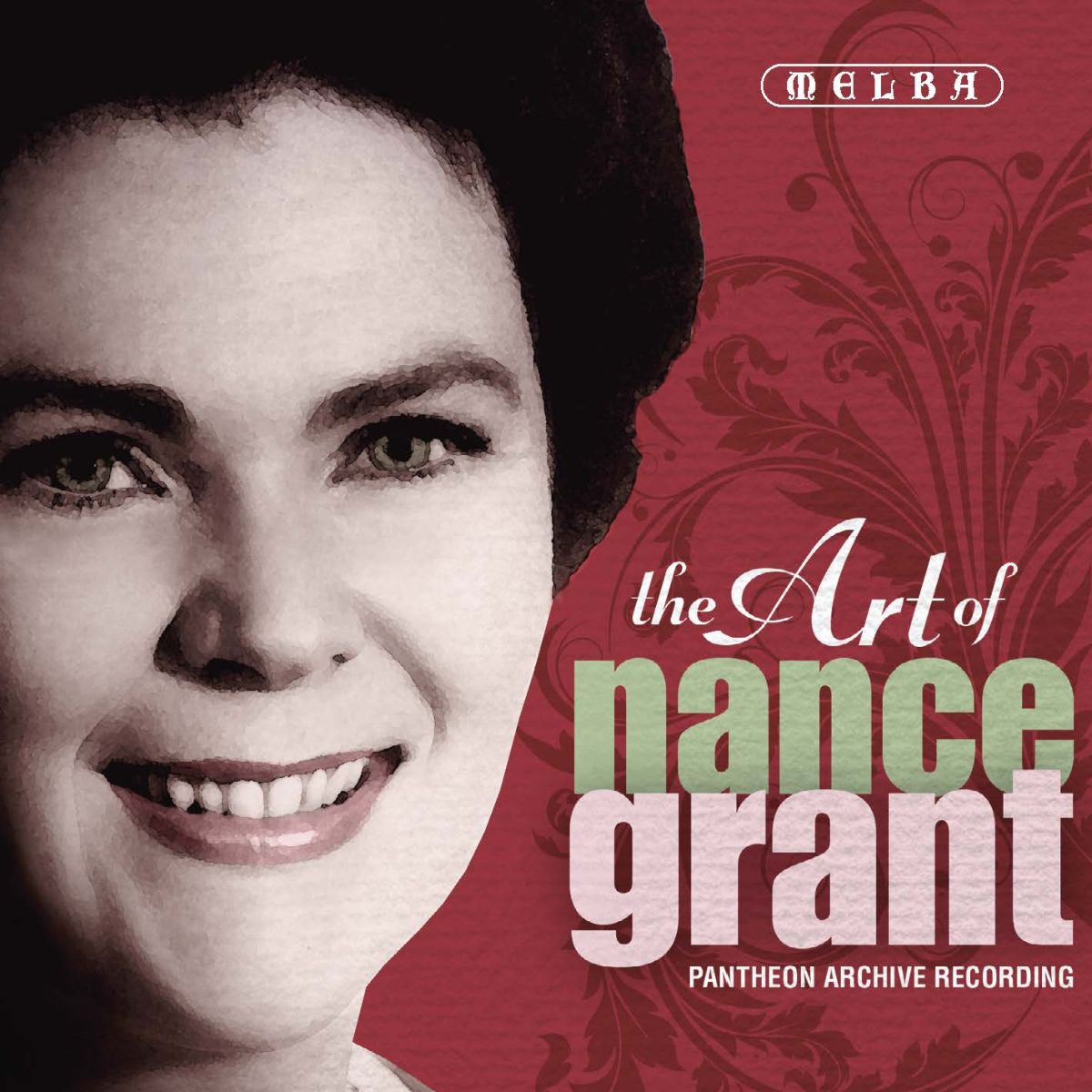

GREAT AUSTRALIAN VOICES VOLUME ONE AND TWO : NANCE GRANT and ROBERT ALLMAN


Click here to order the CD of Nance GRANT
Click here to order the CD of Robert ALLMAN
NANCE GRANT
The first time I ever encountered the name of Australian Nance Grant (1931) was in John Cargher’s wonderful book on opera in Australia who called her “an outstanding Ariadne” and a “highly dramatic Ortrud”. A few years went by until a Swiss collector friend sent me a live recording of Maria Stuarda (role of Elisabetta) and a private CD with some live excerpts from the “outstanding Ariadne”, Walkuere, Tannhauser and Hollaender. Finally I could judge for myself what Nance Grant was all about. The old rogue Cargher was right again of course and “outstanding” she sounded. And these two official Cd releases are an extra confirmation of it. They total 5 cd’s and the good news is they don’t overlap.

The Melba company –thank you Maria Vandamme- was the first to release a 2 CD set to the versatile soprano including Grieg, Strauss and Hageman songs. Especially the Hageman songs are of interest as except for “Do not go, my love” they have been hardly ever recorded. The second CD includes opera, oratorio and Wagner’s Wesendock Lieder. The opera selection includes excerpts from Idomeneo, Ariadne, Fidelio, Maria Stuarda, Tannhauser and Walkure. Nance Grant also sings “Hear ye, Israel” from Mendelsohn’s Elijah.
The Desirée company responsible for issuing those rare early Sutherland recordings has been lying dormant for quite a while but has been resurrected – thank you Brian Castles-Onion- with a new series called “Great Australian Voices” devoted to Australia’s great operatic legacy. So far two volumes have been released and each set contains three discs and a 24 page lavishly illustrated and produced booklet honoring and exploring the career of a Great Australian singer. Nance Grant is honored with the first volume in the series and the recently deceased Robert Allman is featured in volume two. Often complete scenes are included resulting in some real surprises.
The first two Cd’s involving Nance Grant read like an encyclopedia of operatic repertoire starting with Gluck’s “La Corona” to Poulenc’s “Dialogues des Carmelites. Grant not only sings Verdi’s Aida but also Donizetti’s Lucia. The third CD is mainly made up of the song repertoire which not only includes lovely ditties from Benedict, Posford and my compatriot Eva Dell’acqua but also arie anticche, Gounod, Respighi and Roger Quilter.
The voice has the necessary steel for Wagner and it has a bright silvery sound to it. Grant has great power of sostenuto in the upper register and fine breath control. But besides the power the voice also has agility and flexibility. Proof her Sieglinde, her Tannhauser Elisabeth and her ‘highly dramatic Ortrud’ which is included in the compilation as well. Her touching ample-voiced Senta is a credible heroine; neurotic but also brave and unswerving in her loyalty to VanderDecken. As Sieglinde she uses her voice with taste and skills and builds up the tension with the required stamina which is necessary as Charles MacKerras goes for full-blast Wagner. Though the latter may also have to do with the position of the microphones. Her Siegmund is Robert Gard who -if you don’t think of Melchior, Vickers or King and the likes - impresses with a nonetheless unwagnerian voice. Her Fidelio/Leonore shows her in complete control of her resources and she’s pretty successful to surmount the technical difficulties of the part. She ably displays the necessary courageous audacity that befits Beethoven’s heroine. Nance Grant’s career was limited to her homeland, she’s here now and through these wonderful sets her artistry can be enjoyed all over the globe.
ROBERT ALLMAN
Richard Bonynge describes the late Robert Allman (1926-2013) as the possessor of a most beautiful powerful and natural voice with a true Italianate ring assessing Allman as arguably the best baritone voice to come out of Australia in the last century. High praise indeed. After listening to the three cd’s –I never heard both Grant or Allman live - I myself wouldn’t call the voice Italianate, there’s Italianate style but the timbre is more akin to Leonard Warren or George London than say to Bastianini or Sereni. What strikes me most is his rocksure technique which kept the voice fresh and impressive in a career span of 42 years. His enunciation whether singing in German, Italian or English is excellent too and shows his schooling and years of experience while singing in Europe.
In the excerpts we also get treated to some other remarkable voices and rare recorded material. In fact they should be an extra incentive to buy the set as well! In a 1962 (!) Trovatore excerpt or better Der Troubadour from the Vienna Volksoper we get the veteran Manrico of Helge Rosvaenge and a surprise soprano of Christiane (spelled in the booklet as Christine) Sorrell. This former violinist had a 20-year career at the Volksoper and this is the first time I heard her voice.
A German language excerpt from Rigoletto’s final act in Cologne 1963 has Allman sing opposite the American soprano Maria Kallitsi and the conductor is no one less than Bruno Maderna!! Yes, the man of the ‘”dodecaphonic method” also had an eye for his Italian heritage. And judging from the excerpt he displays a great sensitivity to the bard of Busetto’s magnum opus. As conducted by Maderna Verdi’s music clearly has more meaning in relation to the dramatic situation than in the hands of many of Maderna’s compatriots who allow every phrase to sound as though it were indeed meant for an “oom-pah-pah” band. According to a review in “Die Zeit” Maderna (and the soloists) also scored a huge public success. No wonder as the delicacy is there, the sfumature, the game of chiaroscuro and the way Maderna sculpts the orchestral sound makes one long for the complete performance.
In the Aida duet Virginia Zeani simply sounds fabulous (New Orleans 1967) and we get a young Kiri Te Kanawa in the Traviata duet (1978) under Bonynge. Allman is partnered by a fascinating vocal interpretation –no droopiness here- of Dame Joan in Verdi’s Masnadieri and by what the booklet calls ”the greatest of all Australian Neddas” : Maureen Howard in Pagliacci. Other gems include an English language Salome scene opposite Joan Hammond going back to 1960. The tenor in a very excitingly sung “Si pel ciel” is a certain Angelo Marenzi, a name I never heard of but who would sing most -if not all- present day Otellos off the stage.
But let’s focus on Robert Allman whose baritone sounds voluminous enough to these ears. The voice is flexible, evenly-produced, well-placed and used in a tasteful manner. On one occasion or two where Allman pushes the voice too much for volume there’s a slight loss in focus of intonation but don’t forget these are live recordings. It’s hard to select favorite tracks from the three CD’s. His menacing, roguishly sung Iago in the above mentioned duet got me hooked to my speakers from the first note. Equally menacing is his Tonio and Maureen Howard is indeed a revelation as an exciting in this case really Italianate Nedda. As Jochanaan Robert Allman not only gives proof of his excellent German but he delivers the lines with the necessary conviction and manages to communicate the Baptist’s suffering and his vigorous Orest is sung opposite the exciting freshly-voiced Rita Hunter as Elektra. The few spoken lines as Gianni Schicci in English and short as they are show us a zany, inspired practical joker but also his charm and his “Nulla silenzio” the alternate version of Michele’s soliloquy from Tabarrro recorded in 1973 displays his ease in the veristic repertoire as well. His Scarpia is forcefully yet subtly realized and it seems odd to me he never sang Jack Rance as this role must have fit him like a glove. The third CD ends with 5 excerpts from Allman’s Farewell Gala in 1997. The technique is still there and the voice always responds to his intentions but the timbre sounds worn. The Gala also shows Allman’s sense of humour and he also manages to get the audience’s participation in “The Floral Dance” without any difficulty at all. They cheer him to the skies. The Gala was devised, arranged and conducted by Brian Castles-Onion.
These two Desirée releases are an immense joy and strongly recommended. We should buy so that the series has a long future ahead. There must be several more Australian treasures waiting in the vaults.
RvdB